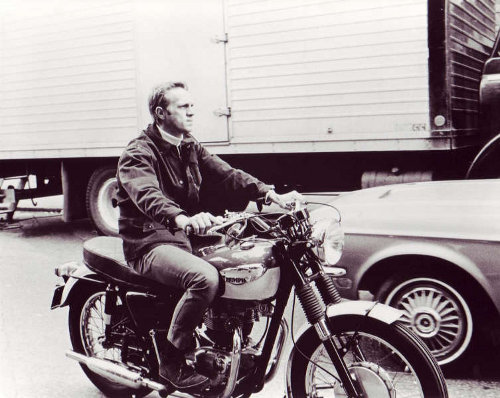 Few things have captured the passion, the sometimes obsession, of men like the motorcycle. There’s no mystery as to why this is. Motorcycles represent a peculiar combination of several manly elements: danger, speed, singular focus, solitude, mechanics, noise, and physical skill.
Few things have captured the passion, the sometimes obsession, of men like the motorcycle. There’s no mystery as to why this is. Motorcycles represent a peculiar combination of several manly elements: danger, speed, singular focus, solitude, mechanics, noise, and physical skill.
Many famous men were motorcycle enthusiasts; they combined their passion for things like acting, music, and adventure, with a love for bikes. Motorcycles were a perfect outlet for their zeal for life; riding the open road with the wind in their faces left them invigorated and inspired. Today we take a look at the relationship ten famous men had with their motorcycles.
T.E. Lawrence

“A skittish motorbike with a touch of blood in it is better than all the riding animals on earth, because of its logical extension of our faculties, and the hint, the provocation, to excess conferred by its honeyed untiring smoothness.” -TE Lawrence
T.E. Lawrence, aka “Lawrence of Arabia” was a passionate motorcyclist and a devotee of the Brough Superior. Brough Superiors were considered the “Rolls Royce of Motorcycles” and Lawrence had his custom-made; short of stature at 5’5, he ordered his bikes with a smaller back wheel to accommodate his height. Lawrence owned seven Brough Superiors during his lifetime, referring to them as his Boanerges (sons of Thunder), and calling each George (the first was George I, the last George VII). In 1935, while riding George VII and awaiting delivery of George VIII, Lawrence swerved to avoid hitting two boys on bicycles, was thrown over the handlebars, and died a week later from his injuries at age 46. Lawrence loved to ride his bikes fast and hard; he was likely going around 100 mph, the bike’s top speed, at the time of the accident.
Marlon Brando
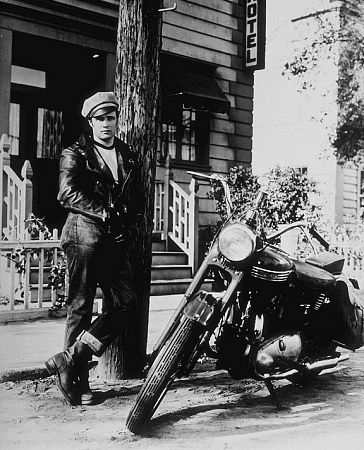
“It still pleases me to be awake during the dark, early hours before morning when everyone else is still asleep. I’ve been that way since I first moved to New York. I do my best thinking and writing then. During those early years in New York, I often got on my motorcycle in the middle of the night and went for a ride–anyplace. There wasn’t much crime in the city then, and if you owned a motorcycle, you left it outside your apartment and in the morning it was still there. It was wonderful on summer nights to cruise around the city at one, two, or three A.M. wearing jeans and a t-shirt with a girl on the seat behind me. If I didn’t start out with one, I’d find one.” -Marlon Brando
Before he became famous, Brando cruised the streets of NYC on his bike, and in the coming decades, whenever his fame started to feel oppressive, he’d get on his motorcyle and simply head out into the Southwest, riding through the desert for miles on end.
In the iconic film, The Wild One, Brando rode a 1950 Triumph 6T Thunderbird.
Bob Dylan

In 1966, Bob Dylan’s career was going full throttle; several of his albums had gone gold and platinum, he was touring the world, and he was soon to publish a novel. His schedule and impending commitments were brutal. Success was crashing over him like a wave, a wave that perhaps would have drowned him if a mysterious motorcycle accident had not intervened. While tooling along near his Woodstock, NY home, Dylan apparently crashed his 1964 Triumph Tiger 100 and suffered an injury to his vertebrae. While he was not taken to a hospital, he enjoyed a long convalescence; he did not return to touring for almost a decade. The accident provided Dylan with a way to slow down his life. He would later say:
“When I had that motorcycle accident … I woke up and caught my senses, I realized that I was just workin’ for all these leeches. And I didn’t want to do that. Plus, I had a family and I just wanted to see my kids.”
Clark Gable

While this seems to be a posed press photo, Clark Gable did indeed ride a motorcycle, a 1934 Harley Davidson RL to be exact.
Hunter S. Thompson
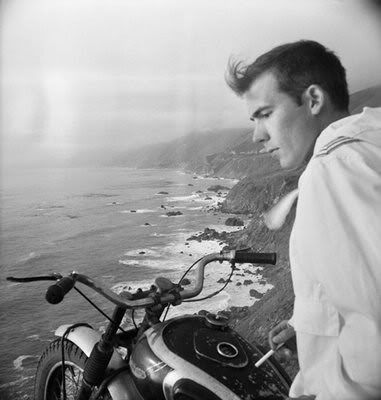
“But with the throttle screwed on there is only the barest margin and no room for mistakes. It has to be done right . . and thats when the strange music starts, when you stretch your luck so far that the fear becomes exhilaration and vibrates along your arms. You can barely see a hundred; the tears blow back so fast that they vaporize before they get to your ears. The only sounds are the wind and the dull roar floating back from the mufflers. You watch the white line and try to lean with it . . . howling through a turn to the right, then to the left and down the long hill to Pacifica . . . letting off now, watching for cops, but only until the next dark stretch and another few seconds on the edge . . . The Edge . . . †– Hunter S. Thompson, Hells Angels
Writer Hunter S. Thompson earned his motorcycling chops the hard way: by riding his BSA A65 Lightning for a year with the Hell’s Angels. His experience riding with (and getting stomped by) the gang became the book, Hells Angels: A Strange and Terrible Saga.

Clint Eastwood

While Eastwood was only an occasional rider in his personal life, he rode motorcycles as part of several of his films. In Coogan’s Bluff, for example, he chases an escaped criminal through Central Park while astride a Triumph Bonneville.
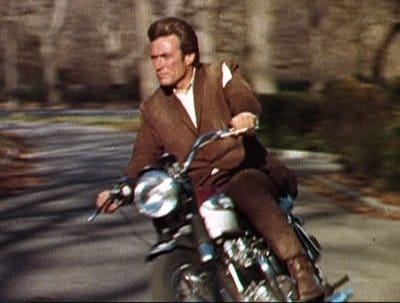
Charles Lindbergh

As a boy, Charles Lindbergh had a keen fascination for the mechanical workings of machines generally and for internal combustion engines in particular. When he was in high school, he ordered a twin-cylinder 1920 model Excelsior “X” motorcycle through the local hardware store. Lindbergh was a shy and quiet young man, but he rode his bike fast, hard, and, as his classmates remembered it, rather recklessly. “I loved its power and speed,” he admitted. On the way to town, Lindbergh would tear through a path that ran past a power plant, through a thicket of bushes, and along the steep banks of the Mississippi River. As an observer remembered, “it seemed like he wanted to see how close to the edge he could get without plunging in.” The owner of the plant became so concerned that he closed off the trail. But the future pilot was as cool on that bike as he was behind the controls of a plane; he never had an accident.
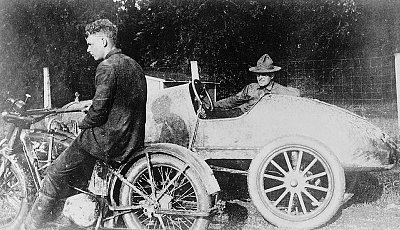
Buddy Holly
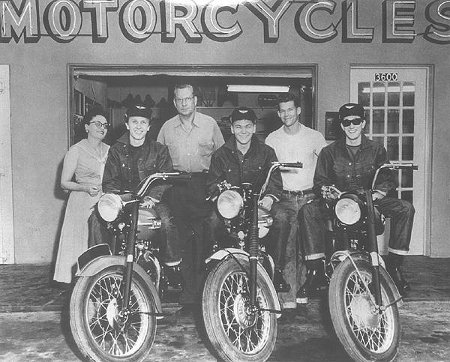
In 1958, coming off a tour and flush with success, Buddy Holly and the Crickets decided to spend some of their hard earned money on new motorcycles. They flew to Dallas and started shopping the local bike stores. But the owners, unaware of who these young lads were, treated them dismissively; the owner of the Harley dealer practically pushed them out the door. But they found what they were looking for at Ray Miller Triumph Motorcycle Sales, where each man picked out one of the latest models: Buddy chose an Ariel Cyclone, J.I. picked a Trophy, and Joe B. decided on a Thunderbird. The guys then headed back to Lubbock on the bikes, but not before stopping by the Harley dealer to show off their new rides.
James Dean
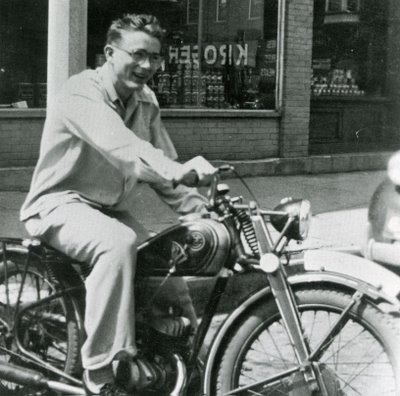
Hope for teenage nerds everywhere. James Dean on his first real motorcycle. Pre-smoldering angst.
Of course the “Rebel Without a Cause” had a thing for motorcycles. He got his first real motorcycle at age 15, a 1947 CZ 125-cc. He was the only kid in his small town in Indiana with his own motorcycle, and he rode it full throttle, losing two teeth in a fall. The locals called him “One Speed Dean.” And that one speed was “wide open.”
When he dropped out of college to pursue acting, he traded his beloved CZ for a Royal Enfield 500cc vertical twin. But he wouldn’t hold onto that bike for long. While home in Indiana on break from working on a play in NYC, Dean decided to ride his Royal Enfield all the way back to the Big Apple. But when it broke down along the way, he traded it in for an Indian Warrior TT. When Dean arrived back in New York, he had the bike serviced at a shop…where Steve McQueen worked as a mechanic.
Later, wanting to emulate Marlon Brando, Dean bought a Triumph TR5 Trophy, the last bike he rode before he died.

Steve McQueen
 There is perhaps no famous man we associate more with motorcycles than the King of Cool, Steve McQueen.
There is perhaps no famous man we associate more with motorcycles than the King of Cool, Steve McQueen.
Before Steve McQueen made it big as an actor, he would compete in–and win–weekend motorcycle races on the first bike he owned–a used Harley. Even when Hollywood success came calling, acting gigs always had to compete against his passion for motorcycles. McQueen amassed a collection of over 100 motorcycles, his favorites being vintage Indians. When the weight of celebrity grew too stifling, McQueen would grab one of those Indian bikes and tear out of Tinseltown and onto the open road. McQueen loved off-road racing as well, and raced the Triumph’s TR6 in everything from the Baja 1000 to the prestigious International Six Days Trial.
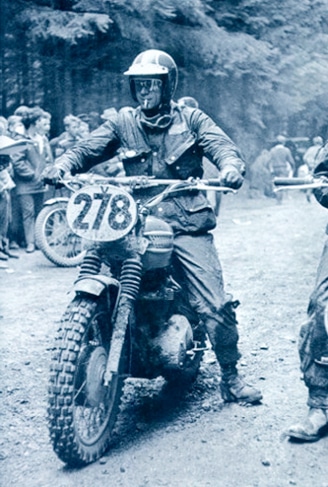 The TR6 also famously makes an appearance in The Great Escape. In that film, McQueen performed many of his own stunts; however, contrary to popular belief, it was not McQueen who jumped his bike over the barbed wire fence in that iconic scene. Because of insurance concerns, Bud Ekins was called in to make the leap.
The TR6 also famously makes an appearance in The Great Escape. In that film, McQueen performed many of his own stunts; however, contrary to popular belief, it was not McQueen who jumped his bike over the barbed wire fence in that iconic scene. Because of insurance concerns, Bud Ekins was called in to make the leap.



